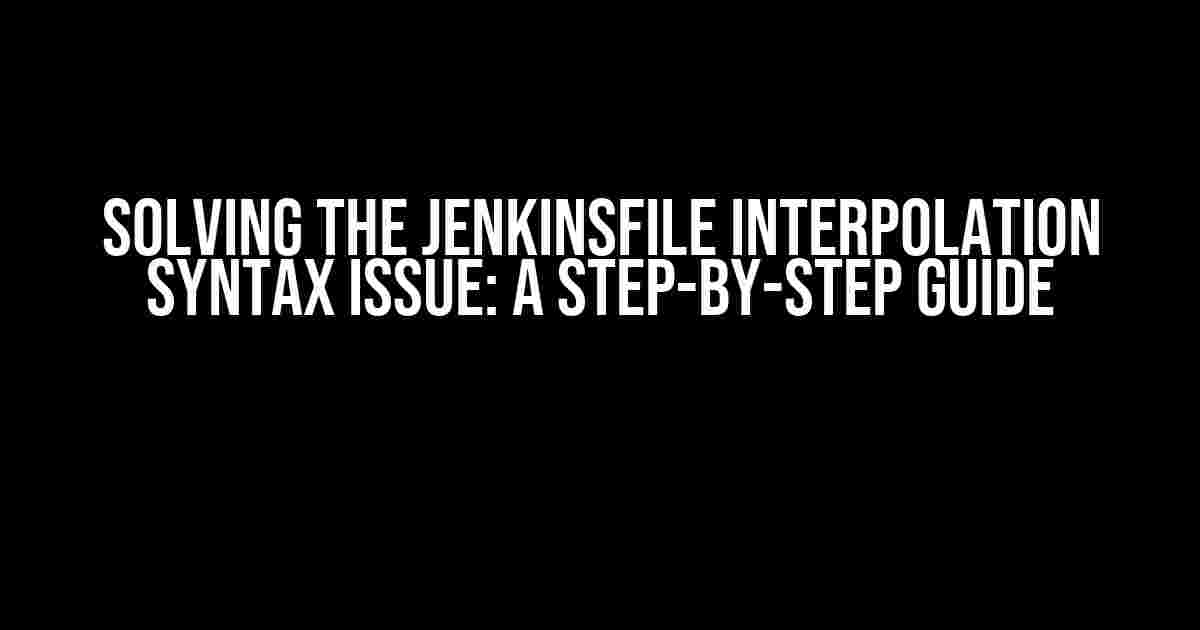What is the Jenkinsfile Interpolation Syntax Issue?
The Jenkinsfile Interpolation Syntax Issue occurs when Jenkins fails to interpolate variables or values within a Groovy script or pipeline code. This results in errors, failed builds, and a whole lot of frustration. The issue often manifests itself in the form of syntax errors, invalid tokens, or unexpected characters.
Causes of the Jenkinsfile Interpolation Syntax Issue
Before we dive into the solutions, it’s essential to understand what causes this issue in the first place. The following are some common culprits:
- Incorrect Syntax: Simple typos, misplaced quotes, or incorrect brackets can lead to interpolation syntax issues.
- Variable Scope: Jenkins has strict rules for variable scoping. If you’re not careful, variables might not be accessible where you need them.
- Groovy vs. Jenkinsfile: Jenkinsfiles use a unique syntax, which can sometimes clash with pure Groovy scripts.
- Plugin Incompatibilities: Outdated or incompatible plugins can cause interpolation issues.
Solving the Jenkinsfile Interpolation Syntax Issue
Now that we’ve covered the causes, let’s get to the good stuff – the solutions! Follow these steps to resolve the Jenkinsfile Interpolation Syntax Issue:
Step 1: Check Your Syntax
The most obvious solution is to review your Jenkinsfile syntax. Go through your code line by line, and:
- Verify quotes, brackets, and parentheses are properly closed and balanced.
- Check for typos, incorrect variable names, or misplaced keywords.
- Ensure you’re using the correct quotes (single, double, or triple) for the context.
def myVar = 'This is a string'
echo ${myVar} // Correct syntax
def myVar = "This is a string"
echo ${myVar} // Correct syntax
def myVar = `This is a string`
echo ${myVar} // Correct syntax (using triple quotes for multiline strings)Step 2: Review Variable Scopes
In Jenkinsfiles, variables can be defined at different scopes:
- Script scope: Defined outside of any stage or block.
- Stage scope: Defined within a stage block.
- Block scope: Defined within a specific block, like a conditional or loop.
Make sure you’re accessing variables within the correct scope. If you’re unable to access a variable, try:
- Moving the variable definition to the appropriate scope.
- Using the
envdirective to set environment variables. - Passing variables as parameters to functions or blocks.
def myVar = 'This is a script scope variable'
stage('My Stage') {
def stageVar = 'This is a stage scope variable'
echo ${myVar} // Accessible
echo ${stageVar} // Accessible
}
if (true) {
def blockVar = 'This is a block scope variable'
echo ${myVar} // Accessible
echo ${stageVar} // Not accessible
echo ${blockVar} // Accessible
}Step 3: Jenkinsfile vs. Groovy Script
Jenkinsfiles use a unique syntax, which can sometimes clash with pure Groovy scripts. To avoid issues:
- Use
defto define variables, instead of implicit definitions. - Avoid using Groovy’s implicit conversions (e.g.,
string -> GString). - Keep your Jenkinsfile organized, using clear and descriptive variable names.
def myVar = 'This is a string'
echo ${myVar} // Correct syntax
myVar = 'This is a string' // Avoid implicit definitions
echo ${myVar} // May cause issuesStep 4: Update Your Plugins
Outdated plugins can cause interpolation issues. Ensure you’re running the latest versions of:
- Jenkins itself.
- Relevant plugins (e.g., Pipeline, Groovy, or specific plugins like Maven or Docker).
Regularly check for updates, and test your Jenkinsfile after updating plugins.
Step 5: Enable Debug Logging (Optional)
If you’re still struggling to identify the issue, enable debug logging to get more detailed information:
pipeline {
agent any
environment {
DEBUG_LOGGING = 'true'
}
stages {
stage('My Stage') {
// Your code here
}
}
}This will provide additional logging information to help you pinpoint the problem.
Common Jenkinsfile Interpolation Syntax Issue Scenarios
Here are some common scenarios where the Jenkinsfile Interpolation Syntax Issue might occur, along with their solutions:
| Scenario | Solution |
|---|---|
| Error: “Unexpected token at line 10, column 5.” | Check for typos, incorrect quotes, or misplaced brackets in the affected line. |
| Error: “No such property: myVar for class: groovy.lang.Binding.” | Verify variable scoping and accessibility. Check if the variable is defined in the correct scope. |
| Error: “Unexpected character: ‘`’.” | Ensure correct usage of single, double, or triple quotes for the context. |
| Error: “Method ‘xyz’ is not applicable for argument types: (java.lang.String) values: [myString].” | Check method signatures and argument types. Verify that the method is being called correctly. |
Conclusion
The Jenkinsfile Interpolation Syntax Issue can be frustrating, but with these steps, you’ll be well-equipped to tackle it head-on. By checking your syntax, reviewing variable scopes, and ensuring correct usage of Jenkinsfile and Groovy syntax, you’ll be able to resolve the issue and get your pipeline running smoothly.
Remember, debugging is an essential part of the development process. Take your time, and don’t hesitate to reach out to the Jenkins community or online resources for additional guidance.
Happy building, and may your pipelines be error-free!
Frequently Asked Questions
Got stuck with Jenkinsfile interpolation syntax issues? Worry not, we’ve got you covered!
What is Jenkinsfile interpolation syntax, and why is it causing me so much trouble?
Jenkinsfile interpolation syntax is a way to inject environment variables, parameters, or even script outputs into your Jenkinsfile. The trouble arises when the syntax isn’t followed correctly, leading to errors and failed builds. For example, incorrectly using double quotes instead of single quotes or vice versa can cause interpolation issues.
How do I fix the ” Undefined variable” error in my Jenkinsfile?
This error usually occurs when you’re trying to use a variable that hasn’t been defined or is out of scope. To fix it, make sure you’ve defined the variable before using it, and that it’s within the correct scope. You can also try using the `env.` prefix to access environment variables or `params.` for pipeline parameters.
What’s the difference between `${ }` and `$$ { }` in Jenkinsfile interpolation?
The main difference is that `${ }` is used for string interpolation, while `$$ { }` is used for escaping. For example, if you want to inject a variable into a string, you’d use `${ }`, but if you want to print a literal dollar sign, you’d use `$$ { }`. This distinction is crucial to avoid syntax errors and ensure your Jenkinsfile works as intended.
Can I use Java-style string concatenation in my Jenkinsfile?
Unfortunately, no. Jenkinsfile uses Groovy syntax, which doesn’t support Java-style string concatenation. Instead, you can use the `+` operator or the `”””` triple quote syntax for multiline strings. For example, `def myString = “Hello, ” + userName + “!”` or `def myMultilineString = “””This is a multiline string.”””`.
How do I troubleshoot Jenkinsfile interpolation syntax issues?
To troubleshoot, try breaking down your Jenkinsfile into smaller sections and isolate the problematic code. Check the Jenkins console output for error messages, which can give you a hint about the issue. You can also use tools like the Jenkinsfile linter or the Groovy Web Console to test your syntax and identify errors before running the pipeline.


